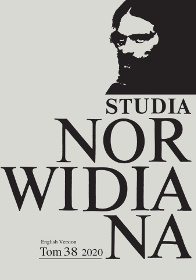Progress and Critical Thought in Norwid’s and Peter Lavrov’s Work
Abstrakt
The Polish romantic poet Cyprian Norwid and the Russian philosopher and sociologist Peter Lavrov met while living as exiles in Paris during the 1870s. They respected each other, although their worldviews could not be reconciled at first sight (though both were discontent with the political status quo). Lavrov was an atheist and considered religion to be a “reactionary” force in the age of scientific progress, slowing down further emancipation of the individual (though it once played a positive role). Norwid – on the other hand – thought that progress without roots in Christian religion would restrict the idea of humanity and reduce it to physiological determinism. This article examines the debate between the Polish Catholic and the Russian atheist in the context of their period, focusing on the negative consequences of a narrowly scientistic attitude (which was, as a matter of fact, rejected by Lavrov), e.g. the relation between contemporary anthropological research and racial theories.
Bibliografia
Biela M., Czy Norwid współpracował z Hyacinthe de Charencey przy pisaniu ‘Syna Panny’, “Studia Norwidiana” 27-28: 2009-2010, pp. 149-183.
Trojanowiczowa Z., Lijewska E., Kalendarz życia i twórczości Cypriana Norwida, Poznań 2007.
Copyright (c) 2020 Studia Norwidiana

Utwór dostępny jest na licencji Creative Commons Uznanie autorstwa – Użycie niekomercyjne – Bez utworów zależnych 4.0 Międzynarodowe.





